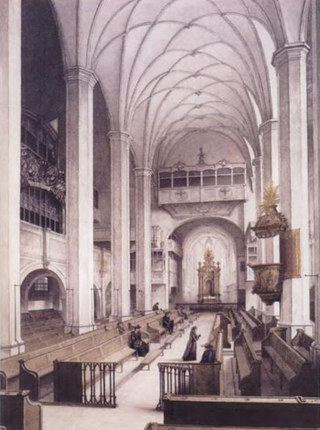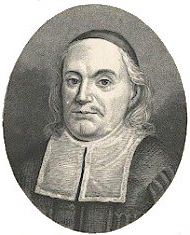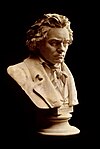Christus am Ölberge, Op. 85, is an oratorio by Ludwig van Beethoven portraying the emotional turmoil of Jesus in the garden of Gethsemane prior to his crucifixion. It was begun in the fall of 1802, soon after his completion of the Heiligenstadt Testament, as indicated by evidence in the Wielhorsky sketchbook. The libretto in German is by the poet Franz Xaver Huber, editor of the Wiener Zeitung, with whom Beethoven worked closely. It was written in a very short period; in a letter to Breitkopf & Härtel written shortly after the oratorio's completion, Beethoven spoke of having written it in "a few weeks", although he later claimed that the piece required no more than 14 days to complete. It was first performed on April 5, 1803 at the Theater an der Wien in Vienna; in 1811, it was revised by Beethoven for publication by Breitkopf & Härtel. The 10 years that passed between the composition of the work and its publication resulted in its being assigned a relatively high opus number. The piece premiered in the United States in 1809; it was Beethoven's first success in the United States.
Antonín Dvořák's Requiem in B♭ minor, Op. 89, B. 165, is a funeral Mass scored for soloists, choir and orchestra. It was composed in 1890 and performed for the first time on 9 October 1891, in Birmingham, England, with the composer conducting.

Herr, gehe nicht ins Gericht mit deinem Knecht, BWV 105 is a church cantata by Johann Sebastian Bach. He composed it in Leipzig for the ninth Sunday after Trinity and first performed it on 25 July 1723. The musicologist Alfred Dürr has described the cantata as one of "the most sublime descriptions of the soul in baroque and Christian art".

Herr, wie du willt, so schicks mit mir, BWV 73, is a church cantata by Johann Sebastian Bach. He composed it for the third Sunday after Epiphany and first performed it in Leipzig on 23 January 1724. It was probably composed shortly before the first performance.

Gott, man lobet dich in der Stille, BWV 120.1, is a sacred cantata by Johann Sebastian Bach. He composed it in Leipzig for the occasion of Ratswechsel, the inauguration of a new town council in a church service, probably before 1730. Parts of the cantata appeared in a wedding cantata and a cantata commemorating the Augsburg Confession in 1730. Bach reworked the choral second movement for the Symbolum Nicenum of his Mass in B minor.

Johann Sebastian Bach composed the church cantata Wer nur den lieben Gott läßt walten, BWV 93, in Leipzig for the fifth Sunday after Trinity and first performed it on 9 July 1724. It is part of his chorale cantata cycle, the second cantata cycle he started after being appointed Thomaskantor in 1723.

Ärgre dich, o Seele, nicht, BWV 186 is a church cantata by Johann Sebastian Bach. He composed it originally in Weimar in 1716 for Advent, BWV 186a, and expanded it in Leipzig in 1723 for the seventh Sunday after Trinity, where he first performed it on 11 July 1723.

Lobe den Herrn, meine Seele, BWV 69, also BWV 69.2, is a cantata by Johann Sebastian Bach.

Christen, ätzet diesen Tag, BWV 63, is a church cantata by Johann Sebastian Bach. He composed the Christmas cantata for the First Day of Christmas, possibly in 1713 for the Liebfrauenkirche in Halle. He performed it again for his first Christmas as Thomaskantor in Leipzig, on 25 December 1723.

Ich hab in Gottes Herz und Sinn, BWV 92, is a cantata by Johann Sebastian Bach for use in the Lutheran service. He composed the chorale cantata in Leipzig for Septuagesimae and first performed it on 28 January 1725. It is based on the hymn "Ich hab in Gottes Herz und Sinn" by Paul Gerhardt (1647), and is the only chorale cantata Bach based on a hymn by Gerhardt.

Meinen Jesum laß ich nicht, BWV 124, is a church cantata written by Johann Sebastian Bach. He composed the chorale cantata in Leipzig for the first Sunday after the Epiphany and first performed it on 7 January 1725. It is based on the hymn "Meinen Jesum laß ich nicht" by Christian Keymann.
In allen meinen Taten, BWV 97, is a church cantata by Johann Sebastian Bach. He composed the chorale cantata in Leipzig in 1734 for an unspecified occasion. The text consists of the unchanged words of the hymn by Paul Fleming (1642).

Wer mich liebet, der wird mein Wort halten, BWV 74, is a church cantata by Johann Sebastian Bach. He composed it in Leipzig for Pentecost and first performed it on 20 May 1725.
Das neugeborne Kindelein, BWV 122, is a church cantata by Johann Sebastian Bach. Bach composed the chorale cantata in six movements in Leipzig for the Sunday after Christmas and first performed it on 31 December 1724.

Süßer Trost, mein Jesus kömmt, BWV 151, is a church cantata by Johann Sebastian Bach. He composed it in Leipzig for the third day of Christmas and first performed it on 27 December 1725.
Ich steh mit einem Fuß im Grabe, BWV 156, is a church cantata by Johann Sebastian Bach. He composed it in Leipzig for the third Sunday after Epiphany and first performed it in 1727 or 1729. The cantata is well known for its opening sinfonia for orchestra and oboe solo.
Gott ist unsre Zuversicht, BWV 197.2, is a church cantata by Johann Sebastian Bach.

Laßt uns sorgen, laßt uns wachen, BWV 213, is a secular cantata by Johann Sebastian Bach. Bach composed it in Leipzig on a text by Picander and first performed it on 5 September 1733. It is also known as Die Wahl des Herkules and Hercules am Scheidewege.

Preise dein Glücke, gesegnetes Sachsen, BWV 215, is a secular cantata by Johann Sebastian Bach. He composed the cantata gratulatoria or Dramma per musica in Leipzig as a Festmusik für das kurfürstlich sächsische Haus for the anniversary of the election of August III, Elector of Saxony, as King of Poland, and first performed it on 5 October 1734 in the presence of the Elector.
Auf, schmetternde Töne der muntern Trompeten, BWV 207.2, is a secular cantata composed by Johann Sebastian Bach and likely premiered in 1735. It utilizes the music from the third movement of the Brandenburg Concerto No. 1 in F major.












